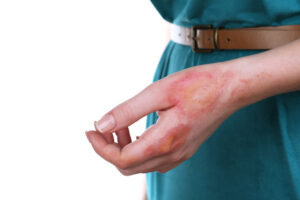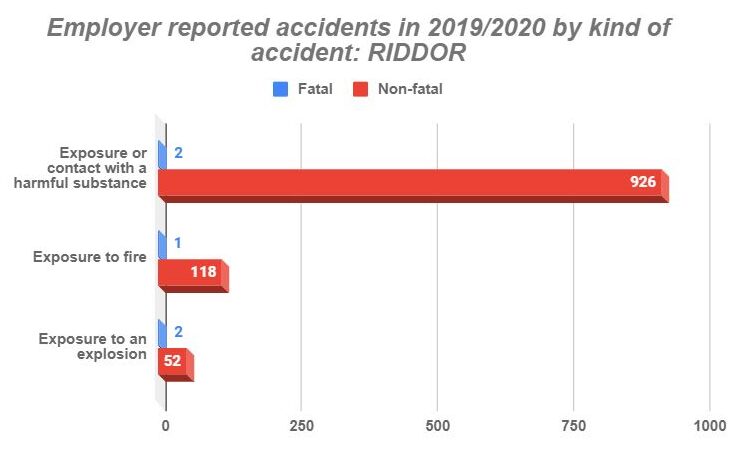By Stephen Bishop. Last Updated 9th May 2024. Have you sustained a chemical burn in an accident at work? Was your accident caused because your employer had been negligent? Could have your injury been avoided? If so, you may be entitled to make a chemical burn at work compensation claim. We understand it may seem like a complex process. However, in our guide, chemical burn at work compensation claims are explained.
No matter how severe your injury, you may be entitled to seek compensation for the pain and suffering you’ve endured. However, you must be able to prove that that the accident was caused because there was a breach in the duty of care owed to you.
If you’re unsure of how negligence occurs, we will explore this in more detail throughout our guide. For instance, by looking at the duty of care an employer owes you and how they could breach this.
Our guide aims to help you understand whether you’re eligible to put forward a personal injury claim. However, if you have any questions whilst reading, please don’t hesitate to get in touch with our team using the details below:
- Phone us on 0161 696 9685
- Chat with an advisor using the live chat box below
- Request a call-back from a member of our team by filling out the contact form
Jump To A Section
- Chemical Burn At Work Compensation Claims Explained
- Statistics On Chemical Related Injuries
- Risk Factors And Causes
- Is My Employer Responsible For My Health And Safety?
- Chemical Burn At Work Compensation – Payout Examples
- Steps To Take If You Suffered A Chemical Burn Injury At Work
- Could I Claim Chemical Burn At Work Compensation With A No Win No Fee Solicitor?
- Useful Resources
Chemical Burn At Work Compensation Claims Explained
Chemical burns are injuries to the skin, eyes, mouth, or internal organs caused by contact with a corrosive substance. They can cause debilitating physical and psychological symptoms that can have an impact on every aspect of a person’s life. For instance, visible burns may have an impact on someone’s self-confidence.
Although not all chemical burn injuries at work result from someone’s failings, they can occur as a result of an employer acting negligently. For instance, your employer failing to provide you with gloves when handling harmful substances.
If you’ve been affected by this type of injury due to someone breaching their duty of care, you could seek compensation for the pain and suffering you’ve endured. Call our team for further guidance.
Statistics On Chemical Related Injuries
According to the Reporting of Injuries, Diseases and Dangerous Occurrences (RIDDOR), employers reported a total of 65,427 non-fatal injuries to employees in 2019/2020.
Additionally, RIDDOR recorded 1,679 non-fatal burns during 2019/2020. The graph below provides an insight into different accidents that could reflect burn injuries.
For more information on chemical burn statistics, see the Health and Safety Executive website (HSE).
Risk Factors And Causes
Chemicals are used in various workplaces such as factories, shops, laboratories, offices, farms, hairdressers. Both employees and members of the public could be at risk if health and safety regulations aren’t adhered to. For instance, a customer at a hair salon could suffer a burn injury if a patch test is not carried out when bleaching the hair.
Additionally, employees working in certain industries may be more at risk of sustaining chemical injuries. For instance, those working with harmful substances, including paints and cleaning products.
Chemical spills could occur through products being loaded incorrectly into a transport vehicle. An employee could then suffer a chemical burn if the products fall onto them while they’re unloading the vehicle.
Additionally, chemical spills could occur on an industrial plant and are a serious risk to employees health and safety. There are various reasons why they could occur, such as:
- Damage to the container causing chemicals to leak
- Employees receive no training on how to store such chemicals safely.
In some cases, your employer may not be liable if they have taken reasonable steps to prevent you from suffering harm.
However, if they failed to check the safety of the work environment and equipment through regular risk assessments, they may have been negligent.
Is My Employer Responsible For My Health And Safety?
All employers must fulfil their duty of care to you. With regards to hazardous substances in the workplace, they must follow the Control of Substances Hazardous to Health Regulations 2002.
Employers should take reasonable steps to prevent or adequately control the risk of exposure to harmful substances. For instance, by providing:
- Training: Employers must ensure you are adequately trained to deal with any health and safety risks.
Furthermore, they must provide training on how to perform your job safely and effectively.
- Personal Protective Equipment (PPE): Employers must implement all other possible measures to combat risks to employees.
However, employers may need to provide PPE even after these measures to prevent employees from suffering avoidable harm.
The specific duty of care you’re owed may depend on your specific workplace. For more information on the duty of care your employer owes you, speak to one of our advisors by calling the number above.
Chemical Burn At Work Compensation – Payout Examples
If you make a successful claim for a chemical burn at work, your settlement could consist of two heads of loss. The first is referred to as general damages, and it compensates you for the pain and suffering your injuries have caused you.
The table below features some of the compensation guidelines listed within the Judicial College Guidelines (JCG). This is a document that may be used by those responsible for valuing your claim for general damages. It lists various types of injuries, including ones related to scarring and burns, alongside guideline compensation brackets.
The table below should be viewed as a guide only. The first entry in the table is not taken from the JCG.
| Injury | Severity | Further details | Compensation Award |
|---|---|---|---|
| Multiple serious injuries plus special damages | Serious | If you have valid grounds to claim for multiple serious injuries including ones caused by chemical burns, then you may receive a payout covering all injuries plus related special damages, such as loss of earnings. | Up to £250,000+ |
| Scarring To Other Parts of the Body | Burns | The award will be given for burns that cover 40% or more of the body whilst taking into consideration other factors such as the psychological impact. | Likely to exceed £127,930 |
| Scarring To Other Parts of the Body | Disfiguring scar or Multiple Noticeable Laceration Scars | The scarring will be present on the hands, arms, legs, chest or back. | £9,560 to £27,740 |
| Facial Disfigurement | Very Severe Scarring | Where injuries have caused a severe psychological impact on the person. | £36,340 to £118,790 |
| Facial Disfigurement | Less Severe Scarring | Considerable disfigurement and a significant psychological impact. | £21,920 to £59,090 |
| Facial Disfigurement | Significant Scarring | The cosmetic effects of the injuries will have improved with plastic surgery and the psychological impact will have also improved. | £11,120 to £36,720 |
| Facial Disfigurement | Less Significant Scarring | A number of very small scars or one scar not markedly affecting the person's appearance. | £4,820 to £16,770 |
| Facial Disfigurement | Trivial Scarring | The effect of this scarring is only minor. | £2,080 to £4,310 |
If you successfully receive general damages, then you may also be awarded a secondary head of loss known as special damages. This compensates you for the financial expenses or losses that have been caused by your injuries, such as skin burn at work.
Some examples of the financial losses you could claim for under this heading include:
- Loss of earnings if you’ve had to take unpaid time off work.
- The cost of certain medical treatments you’ve received as part of your recovery could also potentially be covered. This may include certain procedures or psychiatric treatments if you’ve needed them.
- Travel expenses for important appointments.
Documents such as bank statements or wage slips can help with claiming special damages as part of your chemical burn at work compensation.
For more advice on the amount you could claim for a chemical burn, get in touch with our advisors for free today.
Steps To Take If You Suffered A Chemical Burn Injury At Work
- Seek medical attention: When you suffer an injury, it’s important to seek treatment from a trained medical professional to ensure you avoid any complications from arising. Furthermore, it can provide medical evidence that can outline details of your injury.
- Please speak to a solicitor: Although you can put forward a claim without seeking legal representation, it can be beneficial having the help of an expert solicitor. They can advise further on the steps you need to take to get the compensation you deserve.
- Obtain evidence to prove negligence: Evidence such as CCTV footage, a record of your accident in the workplace accident book, pictures of the accident and your injury and witness details.
For more information, please speak to a member of our team by calling on the number above.
Could I Claim Chemical Burn At Work Compensation With A No Win No Fee Solicitor?
If you hold a valid claim, you could seek legal representation to help you pursue compensation under a No Win No Fee agreement. By choosing this option, you won’t be asked to pay solicitor fees if your claim is unsuccessful.
If your claim is successful, you will be required to pay a legally capped success fee that will be deducted from your overall compensation settlement. However, your solicitor will explain how the fee works and make you aware of it before proceeding with your claim.
Furthermore, this type of agreement can allow you to avoid upfront solicitor fees and costs that may incur as part of the claims process.
For further help and advice, get in touch using the following details:
- Phone us on 0161 696 9685
- Chat with an advisor using the live chat box below
- Please fill out the contact form to request a call-back from a member of our team
Useful Resources
Visit the Changing Faces website for support on dealing with the repercussions of a chemical burn.
See Section 2 of the Health and Safety at Work etc. Act 1974 for more information on the duty of care your employer legally owes you.
- Claiming compensation for an accident at work
- Accidents at work caused by tiredness and fatigue
- Claim compensation for slipping at work and hurting your back
- How to make an NHS accident at work claim
- How to claim compensation for an accident at work during your probationary period
- Why is it important to report accidents in the workplace?
- I was injured due to no workplace training, can I claim?
- How to claim for a back injury suffered while working for the NHS
- Office-based accident at work claims
- How to make a workplace back injury claim
- Employee rights after an accident at work
- Assault at work compensation claims
- Agency worker accident at work claims
- Tendon injury at work claims
- How to make a claim for an injury caused by defective work equipment
- How to claim for a back injury at work caused by lifting?
- Inadequate protective equipment compensation claims
- Ladder accident at work compensation claims
- Stuck in a lift at work? See if you can claim compensation
- Fatal accident at work claims
- Claiming when injured due to lack of work safety boots
- Manual handling claims
- Slip, trip, fall at workplace compensation claims
- Forklift accident compensation claims
- Warehouse accident claims
- Accident working abroad compensation claims
- Construction accident claims
- Self-employed accident at work claims
- Scaffolding accident compensation claims
- Could I be sacked for an accident at work claim?
- Firefighter injured at work claims
- Employers’ responsibilities after a work accident
- Claim for carbon monoxide poisoning at work
- I did not take time off work after an accident, could I claim?
- Claiming for a work accident after leaving the company
- Do employers pay for work-related injury claims?
- Do you have to be an employee to make a work accident claim?
- Time limits for work injury claims
- Part-time employee injury claims
- I got hurt at work, do I need a lawyer?
- The personal injury claims process explained
- Temporary worker’s rights to claim compensation
- The Management Of Health And Safety At Work Regulations 1999
- Who to notify if a fatal accident occurs at work?
- How to use an accident at work claim calculator
- Fatal accident at work claims guide
- Contractor injured at work – can you claim?
- How many lone workers are attacked every day?
- Bulging disc workers’ compensation claims





